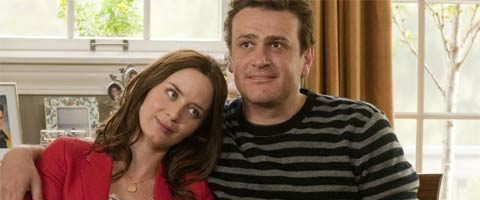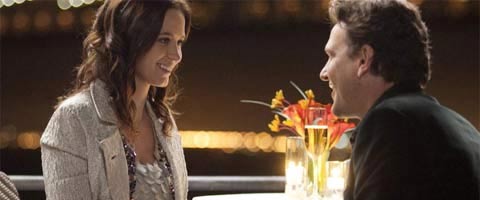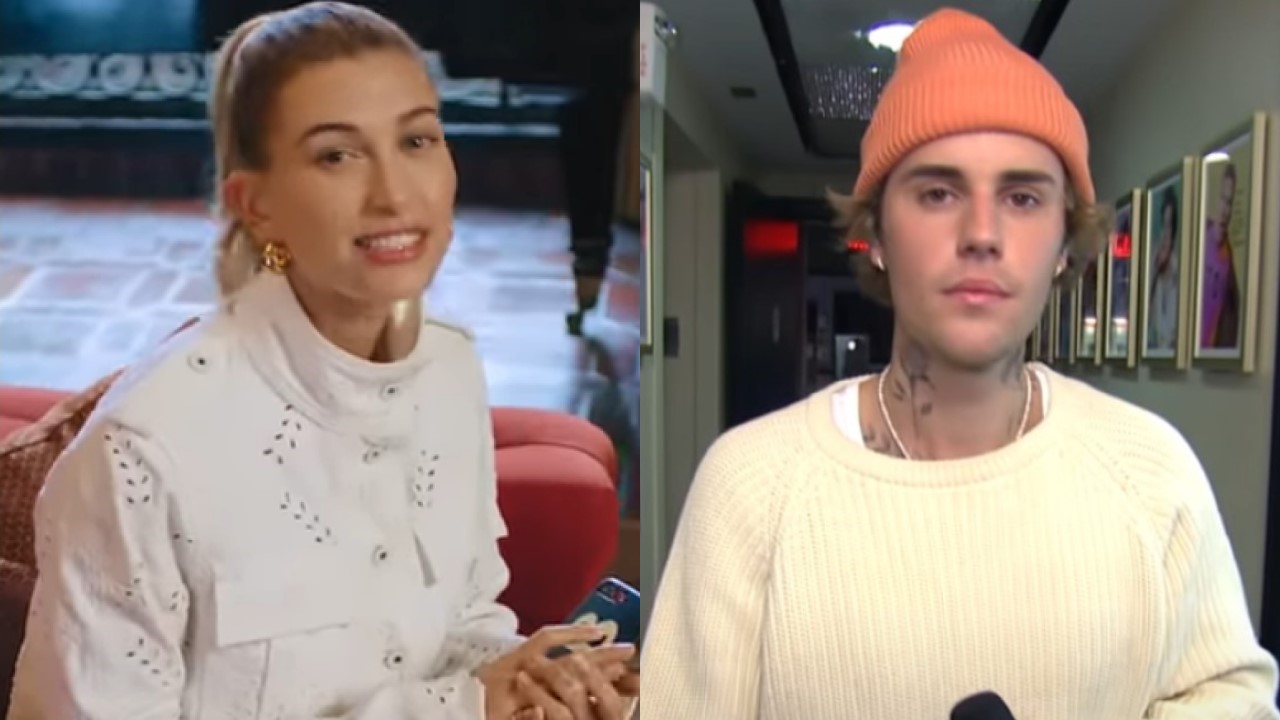Jason Segel And Emily Blunt Talk Resentment And Passive-Aggressive Facial Hair In The Five-Year Engagement

Your Daily Blend of Entertainment News
You are now subscribed
Your newsletter sign-up was successful
There’s an interesting trick that Jason Segel and Emily Blunt pull off in their new comedy, The Five-Year Engagement. When the characters decide to leave their San Francisco home and move to Ann Arbor, Michigan, Segel’s character, Tom, is miserable, but Blunt’s character, Violet, sees all of her dreams start to come true. And yet, at no point in the film does the audience hate Violet for what is happening to her fiancée. But how exactly do they pull that trick off?
I recently had the chance to participate in a roundtable interview with Segel and Blunt to talk about their newest project. Check out the conversation below in which they speak on not only the development of Violet’s character, but getting relationships right, listening to Van Morrison, and passive-aggressive facial hair.
Most romantic comedies nowadays revolve around somebody concealing something or some ridiculous coincidence, like "She's secretly my Boss's daughter." How hard is it to make a romance film, which is simply about the fact that different people can want different things?
Jason Segel: Yeah it was a challenge to write, and was certainly a challenge to edit, because there are no big plot movements. There's no car accident; there's no big earthquake where someone dies or something, and there's also no big contrivance, like "I'm a scientist and she hates science." It’s like a very earnest exploration about how a relationship is fluid, and when you choose a partner and you say, "I want to marry you," you're not saying it for this moment, you're saying it for your whole life and what's going to be ever shifting power dynamics. It really is an honest exploration of relationships, and yeah it was tricky to write, but the best ones are that. Annie Hall is that, and when Harry Met Sally is that.
The Apartment is like that.
Segel: Yes. It's about taking a good hard look at relationships, and I think people can relate to it.
Emily Blunt: I do think with a much more simple premise as well, there's just so much more room to play amongst that. As actors there's a lot you can do to really make these relationships complex and interesting and messy and flawed and loving, and all of those things. It's actually, I think, what you guys were wanting to make. It’s a movie with great heart. The situations these two are put in are ludicrous and outrageous and obviously heightened for the spectacle of the movie, but yet you invest in them as a couple in a very real way, hopefully.
Your Daily Blend of Entertainment News
Based on my cursory knowledge of super market tabloids you, Ms. Blunt, are married, while you Mr. Segel are not?
Blunt: Yes.
Segel: I am not married.

Did you ever find yourself going, "No, no that is not how a marriage works writer boy?" Did you have that?
Blunt: It's funny, because Nick's been married for a long time as well, so he really gests it. Jason, even if he isn't married, he is a romantic. He's been in long-term relationships. I think everyone who was involved in it has had experience with relationships. It felt very collaborative. I mean they did a great first draft, and then I signed on, and I came in and I gave a couple of ideas, and they were incorporated or not, but it was very collaborative, with different perspectives of what we feel about relationships. I think it was a very personal movie. Everyone talked and shared a lot, and a lot of that made it onto the screen.
Segel: Yeah its part of our process, Nick and I. As soon as we hire somebody, especially to play the female lead, the first thing we do is sit down with them, and have a long talk. Just a talk, it’s not even about acting, about how you feel about relationships, how you would actually handle these scenes. Then we do a rewrite to tailor it to the person that’s playing the role.
Violet is this character, who moves to Michigan, her career is flourishing, meanwhile Tom, he's not happy at all, but at no point at all do you feel resentful about her success. I was wondering if you could talk about creating that dynamic and making sure you don't feel that resentment.
Blunt: Well I think I have to credit these guys, because I think it’s a very fine line to tread. You want to understand everyone's predicament really. You can see that Violet isn't fulfilled at the very beginning of the movie, and then she finds her place in the world, she feels, when she moves to Michigan and she has this fantastic job. Yet she can see that it's making her other half suffer, and even though she wants to embolden him and help him and be there for him, he shouldn't martyr himself either. It becomes quite complex as to how she feels in the moment. I think that is a credit to you guys how you wrote that. You don't necessarily side with anyone. You understand people's position. I think it’s no bad thing that Violet's a tenacious girl. I think its no bad thing that Violet is following her dreams. I don't think she's heartlessly doing so. I think she defiantly gets swept up in it for sure, and she's hoping that Tom will be able to survive in this environment as he's promised her he would be able to, so its complex.
Segel: The only reason you question if it's heartless or if it’s selfish is because it’s a woman.
Blunt: Yeah.
Segel: Honest to God. That same plot, if it’s the man that's moving, everyone would be like, "Well of course. It's his job. You've got to go support him." I try to write every part as though I'm going to play it, including the female parts. I don’t think of how would a girl speak or talk. People are all the same. I really do think that. People are all the same. It's going to be a female by the fact that she is biologically a female.
Blunt: Or am I…?
Segel: No one is going to be watching that thinking, "That doesn't seem very much like a woman." She's a woman, and people talk the way they talk.

Aside from the writing, getting a movie like this made, how much harder is it to convince a studio.
Segel: We have Judd behind us. We have a good track record. Also our movies are relatively cheap to make.
Blunt: It wasn't made for that much, this one.
Segel: It wasn't. I don't demand a giant fee, and Nick doesn't demand a giant fee.
Blunt: Everything goes on the screen I think, which is great.
Segel: Yeah. I remember when Judd first pitched Sarah Marshall to them, he said, "I can give you a Ben Stiller movie for the quarter of the price." That was his initial pitch. I think we still stand by that idea. There's no reason to get greedy about it. We're so lucky. We're all doing fine financially. No reason to cut off your nose despite your face just to prove that you're worth it or something.
Your ridiculous facial hair, did that come specifically from Brian Posehn's ridiculous facial hair?
Segel: You're talking about in the film?
Yes. Was that inspired by
Segel: No it was not. Something that I do that I have done in the past, which I call passive aggressive facial hair. I've done it to make a point when I was unemployed. It was kind of like, "Really Hollywood you won't cast me? Well watch this, I don't give a fuck either." That's sort of where it came from. I've done it in a relationship. It is a weird passive aggressive move I have that I'm trying to move past.

The two couples in the film are kind of polar opposite. One is super spontaneous and they just go for it, and you guys were more calculated and would not get married. When you're filming, which did you relate to more or were you just in the middle, because they're very different?
Blunt: I don't know, because that’s what I liked about that storyline of the supposed fuck-ups, Alison and Chris, who are actually the ones who don't over think and just go for it, and end up having a very successful relationship and are very in love. We're the ones who over think everything and strategize everything, and I think that gets in their way as much as their life circumstances get in the way. They get in the way of themselves, trying to wait for the perfect moment. I think I've always been quite a spontaneous person, so I would lean more towards, if you feel it, if you know it’s right, do it.
Segel: I know this sounds strange, but having written all the parts, I think I see everyone's point of view, which is sort of my job in terms of writing it. I think we think they're the idiots going in. It turns out they're exactly right, so I think that’s what's interesting. That’s what we were going for.
I love that one scene when you guys are in bed fighting.
Blunt: It was so much fun to shoot.
Segel: That's how people fight. We really didn't want anything perfectly worded. That's not how a fight goes down.
Blunt: Yeah it should be messy and kind of ugly. It was fun shooting that scene, because I think we were really trying to make it real, like what really happens when you can't stop fighting. What happens? You make up and then someone says something that just tips it over into that awful descent again, then you make it up. It just sort of goes and peaks in troughs all night. It was a lot of fun to shoot. We actually shot it all night, and it was so much fun.
Segel: It was great. That was my favorite.
Blunt: I think you improved that bit where you were like, "Don't leave. We'll stay, but don't look at me."
Segel: So awkward. I hate it.
Blunt: And that awkward hug.
Does that kind of muddled awkwardness, purposeful obviously, does that come from the script directly or does that really come from the improv?
Segel: It comes from the improv, but it really was going in an actual thought out plan. We wanted things to be messy and feel real. It’s my big pet peeve is feeling perfectly worded fights. It's just not how it happens. If you had that kind of composure, you wouldn't be fighting.

Jason you're not afraid to get naked.
Segel: No I love it.
I can tell. Was that real snow that you were rolling around in?
Segel: It was, and they tried to put like a layer of fake warm snow. They developed some like chemically warm snow and I was fucking freezing. There were people surrounded with camera phones watching, it was horrible it was not my best moment. It may be why it was cut out of the film.
Do you tune everyone out when you're doing those kinds of scenes?
Segel: Between action and cut, I'm pretty tuned out in general. I'm pretty focused on what I'm doing. I'm not thinking about much else.
Was it nice for you to do a film without puppets?
Segel: Oh the turkey puppet was cut out!
You had a puppet in this film?
Segel: We did. This is my first film without a puppet in years and years and years. Yeah I was ready to take a little Muppet break. I was doing that for almost a decade.
Well even in Sarah Marshall.
Segel: That's where it all started. It was nice to be acting next to a human.
What was the turkey puppet? What was that?
Segel: There was a Thanksgiving scene, where I end up taking mushrooms, and the turkey comes to life and ends up giving me a long talk about I'm way too old to be taking mushrooms with kids.
Blunt: Yeah and it’s also Brian Posehn's voice as the turkey.
Emily, how long you'd take to learn the Cookie Monster voice?
Blunt: I looked him up on YouTube. I'd watched a lot of Cookie Monster before, but I was like "Oh God I've got to do the table read today. How scary!" it was really nice that people laughed and loved it, and we had a blast doing the scene. It was really fun. Our voices were just gone to shit by the end of the day. We had no voices, because we'd done it all afternoon. It was fun.
Where did the Van Morrison come in? I thought that was lovely.
Segel: Nick loves Van Morrison, and it is my favorite album, "Astral Weeks" Van Morrison. Every couple has a song, or most couples do, and that just seemed like the perfect song. It makes me cry every time I hear it, before this movie -- or not cry, I'm a total macho dude. I just felt like it was a really nice device to see it at the beginning, and then go back to it at the end for the wedding. That actually does make me cry. The wedding at the end actually really jokes me up. I think it's so romantic.

Eric Eisenberg is the Assistant Managing Editor at CinemaBlend. After graduating Boston University and earning a bachelor’s degree in journalism, he took a part-time job as a staff writer for CinemaBlend, and after six months was offered the opportunity to move to Los Angeles and take on a newly created West Coast Editor position. Over a decade later, he's continuing to advance his interests and expertise. In addition to conducting filmmaker interviews and contributing to the news and feature content of the site, Eric also oversees the Movie Reviews section, writes the the weekend box office report (published Sundays), and is the site's resident Stephen King expert. He has two King-related columns.
